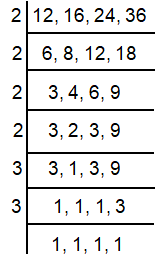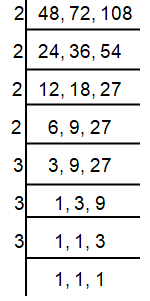WORD PROBLEMS ON LCM AND HCF
Problem 1 :
Find the least number which when divided by 12, 16, 24 and 36 leaves a remainder 7 in each case.
Solution :
To find the least number which is divisible by 12, 16, 24 and 36, we need to find LCM of these numbers.

= 2 × 2 × 2 × 2 × 3 × 3
= 144
LCM of 12, 16, 24 and 36 is 144
Least number which when divided by 12, 16, 24 and 36 leaves a remainder 7 in each case = 144 + 7 = 151
Problem 2 :
The length, breadth and height of a room are 825 cm, 675 cm and 450 cm respectively. Find the longest tape which can measure the three dimensions of the room exactly.
Solution :
Given, length of a room = 825 cm
Breadth of a room = 675 cm
Height of a room = 450 cm
We have to factorize all three given dimensions.
825 = 3 × 5 × 5 × 11
675 = 3 × 3 × 3 × 5 × 5
450 = 2 × 3 × 3 × 5 × 5
HCF = 3 × 5 × 5 = 75
Hence, the length of the longest tape should be 75 cm.
Problem 3 :
Determine the smallest 3 digit number which is exactly divisible by 6, 8 and 12.
Solution :
Smallest number exactly divisible by 6, 8 and 12
LCM of 6, 8, and 12 is 24
So, the smallest three digit multiple of 24 will be,
100 = (100 - 4) + 24
= 96 + 24
= 120
Hence, the smallest 3 digit number which is exactly divisible by 6, 8 and 12 is 120.
Problem 4:
Determine the greatest 3 digit number exactly divisible by 8, 10 and 12.
Solution:
LCM of 8, 10 and 12 = 2 × 2 × 2 × 3 × 5
= 120
Finding the largest 3 digit number which is multiple of 120
We know that largest 3 digit number is 999
Dividing 999 by 120 we get
999 = 120 × 8 + 39
If we subtract the remainder from 999 we get the largest 3 digit number which is multiple of 120
120 × 8 = 999 - 39 = 960
960 is the largest 3 digit number which is multiple of 120.
Hence, the largest 3 digit number which is exactly divisible by 8, 10 and 12 is 960.
Problem 5 :
The traffic lights at three different road crossings change after every 48 seconds, 72 seconds and 108 seconds respectively. If they change simultaneously at 7 a.m., at what time will they change simultaneously again?
Solution :

LCM of 48, 72 and 108 = 2 × 2 × 2 × 2 × 3 × 3 × 3
= 432
Hence, after every 432 seconds, the light will change simultaneously.
Thus, the required time is 432 seconds which can be converted into minutes and seconds as 7 minutes 12 seconds past 7 a. m.
Problem 6 :
Renu purchases two bags of fertilizer of weights 75 kg and 69 kg. Find the maximum value of weight which can measure the weight of the fertilizer exact number of times.
Solution :
Finding the maximum number of weight we have to find the HCF of 75 kg and 69 kg
75 = 3 × 5 × 5
69 = 3 × 23
So, HCF of 75 kg and 69 kg is 3.
Hence, the required maximum value of weight is 3 kg.
Problem 7 :
In a seminar, the number, the number of participants in Hindi, English and Mathematics are 60, 84 and 108 respectively. Find the minimum number of rooms required if in each room the same numbers of participants are to be seated and all of them being in the same subject.
Solution :
The number of participants in each room must be the HCF of 60, 84 and 108.
60 = 2 × 2 × 3 × 5
84 = 2 × 2 × 3 × 7
108 = 2 × 2 × 3 × 3 × 3
HCF = 2 × 2 × 3 = 12
So, the minimum number of rooms required
= Total number of participants / 12
= (60 + 84 + 108) / 12
= 252/12
= 21
Hence, required number of rooms = 21
Problem 8 :
144 cartons of Coke cans and 90 cartons of Pepsi cans are to be stacked in a canteen. If each stack is of the same height and is to contain cartons of the same drink, what would be the greatest number of cartons each stack would have?
Solution :
Number of cartons of coke cans = 144
Number of cartons of Pepsi cans = 90
144 = 2 × 2 × 2 × 2 × 3 × 3
90 = 3 × 3 × 5 × 2
HCF = 3 × 3 × 2
= 18
So, the HCF of 144 and 90 is 18.
Hence, number of cartons in each stack = 18
Problem 9 :
A merchant has 120 liters of oil one kind, 180 liters of another kind and 240 liters of third kind. He wants to sell the oil by filling the three kinds of oil in tins of equal capacity. What would be the greatest capacity of such a tin?
Solution :
Find the HCF of 120, 180 and 240.
120 = 2 × 2 × 2 × 3 × 5
180 = 2 × 2 × 3 × 3 × 5
240 = 2 × 2 × 2 × 2 × 3 × 5
HCF = 2 × 2 × 3 × 5
= 60
HCF of 120, 180 and 240 is 60.
So, the merchant needs to fill 60 liters of all types of oils.
Problem 10 :
Three tankers contain 403 litres, 434 litres and 465 litres of diesel respectively. Find the maximum capacity of a container that can measure the diesel of the three containers exact number of times.
Solution :
Amount of diesel present in the first tank = 403 litres
Amount of diesel present in the second tank = 434 litres
Amount of diesel present in the third tank = 465 litres
403 = 13 × 31
434 = 2 × 7 × 31
465 = 3 × 5 × 31
HCF of 403, 434, and 465 is 31.
Hence, the maximum capacity of the container should be 31 litres.
Problem 11 :
Find the least number which when divided by 6, 15 and 18 leave remainder 5 in each case.
Solution :
LCM of 6, 15 and 18 using prime factorization
6 = 2 × 3
15 = 3 × 5
18 = 2 × 3 × 3
LCM of 6, 15 and 18 = 2 × 3 × 3 × 5
= 90
To get a remainder 5, we need to add 5 to the LCM.
90 + 5 = 95.
Therefore, when 95 is divided by the given numbers, we get a remainder of 5 in each case.
Problem 12 :
Find the smallest 4 digit number which is divisible by 18, 24 and 32.
Solution :
Smallest number divisible by 18, 24 and 32
18 = 2 × 3 × 3
24 = 2 × 3 × 2 × 2
32 = 2 × 2 × 2 × 2 × 2
LCM = 2 × 2 × 2 × 2 × 2 × 3 × 3
= 288
288 is the smallest number divisible by 18, 24 and 32.
Now, smallest 4 digit number = 1000
1000 = 288 × 3 + 136
Remainder = 136
But we need to find a number where the remainder is 0.
Required number = 1000 + (288 - 136)
= 1000 + 152
= 1152
So, 1152 is the smallest 5 digit number.
Recent Articles
-
Finding Range of Values Inequality Problems
May 21, 24 08:51 PM
Finding Range of Values Inequality Problems -
Solving Two Step Inequality Word Problems
May 21, 24 08:51 AM
Solving Two Step Inequality Word Problems -
Exponential Function Context and Data Modeling
May 20, 24 10:45 PM
Exponential Function Context and Data Modeling